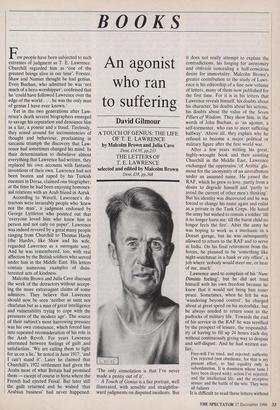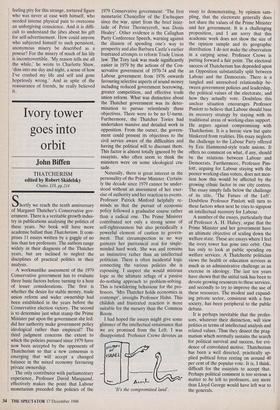BOOKS
An agonist who ran to suffering
David Gilmour
Few people have been subjected to such extremes of judgment as T. E. Lawrence. Churchill regarded him as 'one of the greatest beings alive in our time'. Forster, Shaw and Namier thought he had genius. Even Buchan, who admitted he was 'not much of a hero-worshipper', confessed that he 'could have followed Lawrence over the edge of the world. . . he was the only man of genius I have ever known.'
Yet in the two generations after Law- rence's death several biographers emerged to savage his reputation and denounce him as a liar, a poseur and a fraud. Tirelessly, they nosed around for inconsistencies of thought and behaviour, proclaiming in sarcastic triumph the discovery that Law- rence had sometimes changed his mind. In their determination to disbelieve almost everything that Lawrence had written, they replaced his own accounts with fantastic inventions of their own. Lawrence had not been beaten and raped by his Turkish enemies in Deraa, claimed one biographer; at the time he had been enjoying homosex- ual relations with an Arab friend in Azrak.
According to Wavell, Lawrence's de- tractors were invariably people who 'knew not the man', a judgment endorsed by George Lyttleton who pointed out that 'everyone loved him who knew him in person and not only on paper'. Lawrence was indeed revered by a great many people ranging from Churchill to Thomas Hardy (the Hardys, like Shaw and his wife, regarded Lawrence as a surrogate son). And he was remembered, too, with real affection by the British soldiers who served under him in the Middle East. His letters contain numerous examples of disin- terested acts of kindness.
Malcolm Brown and Julia Cave discount the work of the detractors without accept- ing the more extravagant claims of some admirers. They believe that Lawrence should now be seen 'neither as saint nor charlatan but as a man of great intelligence and vulnerability trying to cope with the pressures of the modern age'. The source of their subject's most harrowing pressure was his own conscience, which forced him into repeated reconsideration of his role in the Arab Revolt. For years Lawrence alternated between feelings of guilt and satisfaction. 'We are calling them to fight for us on a lie,' he noted in June 1917, 'and I can't stand it'. Later he claimed that Churchill's 1922 settlement had given the Arabs most of what Britain had promised them — except of course in Syria where the French had ejected Feisal. But later still the guilt returned and he wished 'that Arabian business' had never happened: 'The only consolation is that I've never made a penny out of it'.
A Touch of Genius is a fair portrait, well illustrated, with sensible and straightfor- ward judgments on disputed incidents. But it does not really attempt to explain the contradictions, his longing for anonymity and oblivion concealing a half-conscious desire for immortality. Malcolm Brown's greater contribution to the study of Lawr- ence is his editorship of a fine new volume of letters, many of them now published for the first time. For it is in his letters that Lawrence reveals himself, his doubts about his character, his doubts about his actions, his doubts about the value of the Seven Pillars of Wisdom. They show him, in the words of John Buchan, as 'an agonist, a self-tormentor, who ran to meet suffering halfway'. Above all, they explain why he refused to become a major political or military figure after the first world war.
After a few years writing his great, highly-wrought book and then assisting Churchill in the Middle East, Lawrence exchanged the oppressive 'of Arabia' gla- mour for the anonymity of an aircraftsman under an assumed name. He joined the RAF, which he grew to love, partly from a desire to degrade himself and 'partly to avoid the current of other men's thinking'. But his identity was discovered and he was forced to change his name again and enlist as ,a private in the Tank Corps. He hated the army but wished to remain a soldier `till it no longer hurts me: till the burnt child no longer feels the fire'. After the army he was hoping to work as a mechanic in a Dorset garage, but he was subsequently allowed to return to the RAF and to serve in India. On his final retirement from the forces, he planned to be 'something like night-watchman in a bank or city office', a job where 'nobody would meet me, or hear of me, much'.
Lawrence used to complain of his 'Mince Diminis feeling', but he did not trust himself with his own freedom because he knew that it would not bring him inner peace. Sometimes, when he felt he was 'wandering beyond control', he charged about at great speed on his motorbike, but he always needed to return soon to the padlocks of military life. Towards the end of his service in the RAF he was terrified by the prospect of leisure, the responsibil- ity of having to fill up 24 hours each day without continuously giving way to despair and self-disgust. And he had written ear- lier,
Free-will I've tried, and rejected: authority I've rejected (not obedience, for that is my present effort, to find equality only in subordination. It is dominion whose taste I have been cloyed with): action I've rejected: and the intellectual life: and the receptive senses: and the battle of the wits. They were all failures . . .
It is difficult to read these letters without feeling pity for this strange, tortured figure who was never at ease with himself, who needed intense physical pain to overcome an unforgiving conscience. And it is diffi- cult to understand the jibes about his gift for self-advertisement. How could anyone who subjected himself to such persistent, anonymous misery be described as a poseur? For the misery of much of his life is incontrovertible. 'My reason tells me all the while,' he wrote to Charlotte Shaw, 'dins into me day and night, a sense of how I've crashed my life and self and gone hopelessly wrong.' And in spite of the reassurance of friends, he really believed It.



























































 Previous page
Previous page